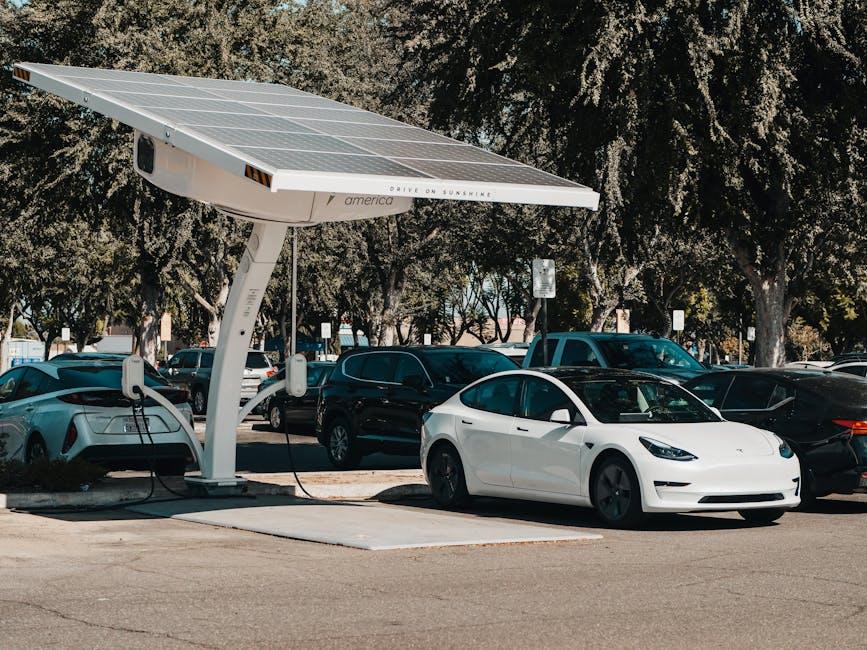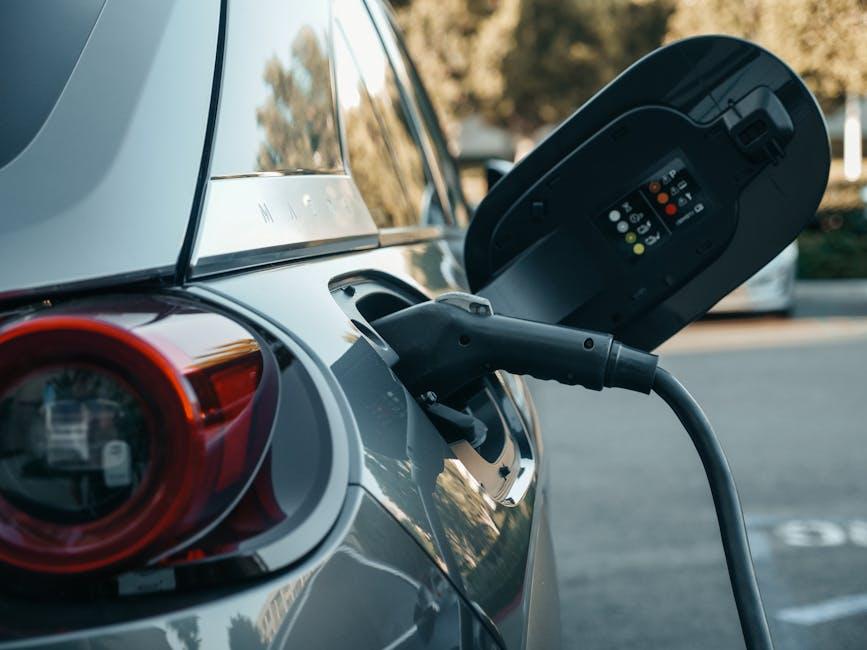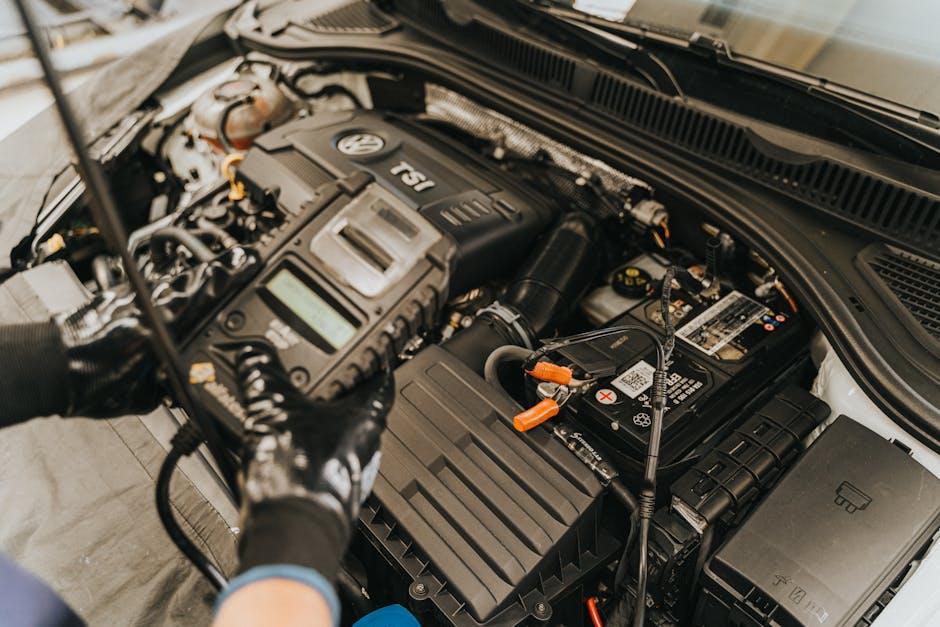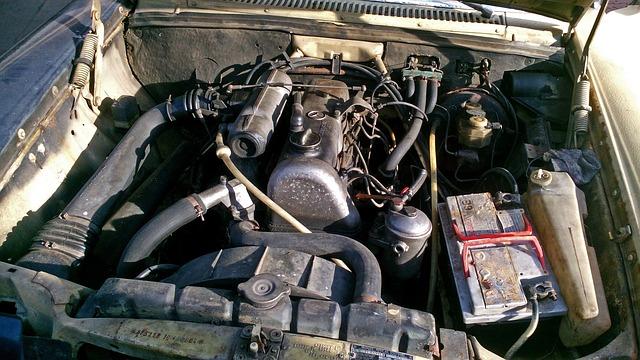Beneath the hood of every car lies a silent powerhouse—the battery—that fuels the vehicle’s start and keeps its electrical systems humming. Yet, over time, a common but often misunderstood foe begins to take its toll: battery corrosion. Those crusty, powdery deposits clinging to the terminals aren’t just unsightly; they can disrupt your car’s performance and lead to frustrating breakdowns. But what exactly causes this corrosion to develop? In this article, we’ll explore the chemical reactions, environmental factors, and maintenance habits that contribute to car battery corrosion, shedding light on how this small but troublesome issue can impact your vehicle’s reliability.
Table of Contents
- Understanding the Chemical Reactions Behind Battery Corrosion
- Environmental Factors That Accelerate Corrosion on Car Batteries
- How Overcharging and Electrical Issues Contribute to Corrosion
- The Role of Battery Age and Maintenance in Corrosion Development
- Effective Cleaning Techniques to Combat Corrosion Buildup
- Preventative Measures to Extend Battery Life and Minimize Corrosion
- Q&A
- In Conclusion

Understanding the Chemical Reactions Behind Battery Corrosion
At the heart of a car battery’s corrosion lies a series of intricate chemical reactions primarily involving sulfuric acid and lead plates. When a battery charges and discharges, electrochemical processes generate hydrogen gas at the negative terminal and lead sulfate crystals on the plates. Over time, the battery acid (a mix of sulfuric acid and water) reacts with metals exposed at the terminals, particularly lead and its alloys, resulting in the formation of corrosive substances like lead sulfate and lead oxide. This buildup manifests externally as the flaky, white or bluish-green deposits commonly mistaken for rust but actually a combination of these chemical byproducts.
Several contributing factors accelerate these reactions:
- Electrolyte leakage: Slight spills or crystallization on terminal surfaces increase corrosion risk.
- Overcharging: Excessive current produces more hydrogen gas, which reacts with moisture and metal ions to create corrosion.
- Environmental exposure: Humidity and road salts act as catalysts, speeding up chemical degradation.
Understanding these reactions underlines the importance of regular maintenance, such as cleaning terminals and ensuring proper charging, to neutralize acid build-up and prevent electrochemical damage that can compromise battery life and vehicle performance.
| Chemical Compound | Resulting Corrosion Deposit | Visual Appearance |
|---|---|---|
| Lead Sulfate (PbSO₄) | White crystalline buildup | White powdery flakes |
| Lead Oxide (PbO) | Powdery and flaky rust-like layer | Dull yellow-brown crust |
| Hydrogen Gas (H₂) | Gas released during charging | Invisible but promotes corrosion |

Environmental Factors That Accelerate Corrosion on Car Batteries
Several environmental conditions can hasten the degradation of your car battery terminals, causing rust, residue buildup, and overall corrosion. High humidity plays a significant role by creating a moist environment that encourages chemical reactions between the battery’s lead terminals and any acidic residue that may form. Additionally, extreme temperatures—both intense heat and harsh cold—can weaken the seals of the battery, allowing corrosive gases to escape and settle on the terminals. These environmental pressures act like an unseen enemy, quietly breaking down the components essential to your car’s power source.
Other external contributors include exposure to road salt during winter months or driving through acidic pollutants in urban areas. These iron-rich particles can cling to the battery surfaces, further exacerbating corrosion once moisture is introduced. The table below highlights common environmental factors and their typical effects on car batteries:
| Environmental Factor | Effect on Battery |
|---|---|
| High Humidity | Encourages acid residue formation on terminals |
| Extreme Heat | Weakens battery seals, increases gas leakage |
| Cold Temperatures | Causes shrinkage, allowing corrosion to enter |
| Road Salt | Accelerates metallic corrosion on terminals |
| Urban Pollutants | Deposits acidic particles, enhances corrosion risk |

How Overcharging and Electrical Issues Contribute to Corrosion
Excessive voltage from overcharging forces the electrolyte inside the battery to overheat and vaporize rapidly, causing the corrosive acid to leak from around the terminals. This leakage not only eats away at the metal parts but also accelerates the build-up of white, powdery deposits that hinder electrical conductivity. Coupled with this, irregularities in the vehicle’s charging system, such as faulty alternators or broken wiring, produce inconsistent current flow that stresses the battery terminals, further encouraging rust and degradation.
Multiple factors linked to electrical problems contribute to corrosion, including:
- High charging voltage: Creates heat and pressure inside the battery, forcing acid outward.
- Voltage spikes: Occur from faulty regulators causing sudden surges that accelerate deterioration.
- Poor connections: Increase resistance, generating localized heat and promoting oxidation.
| Electrical Issue | Impact on Battery | Resulting Corrosion Type |
|---|---|---|
| Overcharging | Excessive acid leakage | White crystalline buildup |
| Voltage spikes | Terminal stress and heat | Rust and metal pitting |
| Poor terminal connections | Increased resistance | Localized oxidation and corrosion |

The Role of Battery Age and Maintenance in Corrosion Development
As batteries age, their internal chemistry begins to shift, increasing the likelihood of corrosion around the terminals. Over time, the protective layers on battery posts can wear down, allowing acid vapors to escape and react with metal connectors. This slow degradation often leads to white, green, or bluish deposits that hinder electrical flow and compromise the battery’s performance. Without proper maintenance, even a relatively new battery can develop corrosion prematurely, creating a domino effect on the electrical system.
Maintaining a battery goes beyond occasional checks—it involves consistent care that can significantly reduce corrosion risks. Key maintenance practices include:
- Regular Cleaning: Wiping terminals with a baking soda solution to neutralize acid
- Tightening Connections: Ensuring clamps are secure to prevent leaks and sparks
- Applying Protective Coatings: Using grease or commercial sprays designed to repel moisture and acid vapors
- Monitoring Fluid Levels: Especially in older batteries requiring periodic electrolyte top-ups
| Battery Age (Years) | Corrosion Risk Level | Maintenance Frequency |
|---|---|---|
| 0-2 | Low | Monthly |
| 3-5 | Moderate | Bi-weekly |
| 5+ | High | Weekly |

Effective Cleaning Techniques to Combat Corrosion Buildup
To tackle corrosion buildup on your car battery effectively, it’s essential to approach the cleaning process with precision and the right materials. Start by wearing protective gloves and eye protection to shield yourself from hazardous acid deposits. Begin by disconnecting the battery terminals—always the negative terminal first—to avoid accidental short-circuiting. Using a mixture of baking soda and water creates a powerful neutralizing agent that can break down corrosion without damaging the battery. Apply this solution generously with a soft brush to scrub away the white, crusty deposits. Afterward, rinse with clean water and dry thoroughly with a microfiber cloth to prevent moisture buildup, which can accelerate further corrosion.
Incorporating preventative measures during your cleaning routine ensures longer battery life and reduces the frequency of maintenance. Consider applying a thin layer of petroleum jelly or a commercial battery terminal protectant on the terminals to create a moisture barrier. Regular inspection and cleaning intervals—ideally every 3 to 6 months—will keep corrosion in check. Below is a simple guide to help you maintain corrosion suppression:
| Technique | Frequency | Benefit |
|---|---|---|
| Cleaning with baking soda solution | Every 3-6 months | Neutralizes acid deposits |
| Applying petroleum jelly on terminals | After every cleaning | Prevents moisture buildup |
| Visual inspection | Monthly | Early detection of corrosion |
- Use a toothbrush or battery terminal brush for precision.
- Avoid using metal tools that could cause sparks.
- Ensure the battery is fully dry before reconnecting terminals.

Preventative Measures to Extend Battery Life and Minimize Corrosion
Maintaining your car battery’s health requires proactive care to fend off corrosion and extend its lifespan. One of the most effective strategies is to ensure the battery terminals are kept spotless and dry. Regular inspection and cleaning with a mixture of baking soda and water can neutralize any acid buildup, preventing corrosive deposits from forming. Additionally, applying a thin layer of petroleum jelly or a specialized corrosion-preventive spray creates a protective barrier against moisture and air exposure, which are key contributors to corrosion.
Equally important is to minimize factors that accelerate battery wear and corrosion. Avoiding short, frequent trips allows the battery to fully charge and prevents sulfate crystals from building up on the plates. Keeping electronic accessories off while the engine is off reduces unnecessary drain, helping to preserve charge levels. Here’s a quick reference chart showcasing common habits versus their impact on battery corrosion:
| Habit | Impact on Battery | Recommended Action |
|---|---|---|
| Ignoring Terminal Cleaning | High corrosion risk | Clean every 3 months |
| Frequent Short Trips | Battery undercharged | Occasional longer drives |
| Using Electronics with Engine Off | Accelerated charge drain | Limit use when parked |
Q&A
Q: What exactly is car battery corrosion?
A: Car battery corrosion is the build-up of a chalky, often white or bluish substance around the battery terminals. It’s typically caused by a chemical reaction between the battery acid and the metal terminals, creating a flaky or powdery deposit.
Q: Why does this corrosion happen in the first place?
A: At the heart of it, corrosion forms because of the natural chemical exchanges inside the battery. When sulfuric acid inside the battery interacts with the lead terminals, it can emit hydrogen gas. When this gas meets water vapor or moisture in the air, it creates corrosion compounds like lead sulfate or copper sulfate.
Q: Are there specific conditions that make corrosion more likely?
A: Absolutely. High temperatures accelerate the chemical reactions inside the battery, increasing the chance of corrosion. Overcharging, leaks from the battery acid, and even humidity also play a big role. Plus, batteries that are older or poorly maintained tend to corrode faster.
Q: Does the type of battery affect corrosion?
A: Yes, traditional lead-acid batteries are more prone to corrosion because of their chemical makeup. Meanwhile, newer battery technologies like AGM (Absorbent Glass Mat) are less likely to experience corrosion, though they aren’t completely immune.
Q: Can corrosion affect my car’s performance?
A: Definitely. Corroded terminals can disrupt the electrical connection, leading to difficulty starting your car, dimming lights, or even complete battery failure. It’s more than just an eyesore — it can lead to real mechanical headaches.
Q: How can I prevent or reduce battery corrosion?
A: Regular cleaning and maintenance go a long way. Applying protective sprays or grease on the terminals can block moisture and acid from causing corrosion. Also, ensuring your battery is securely mounted and not leaking prolongs its life.
Q: Is corrosion dangerous? Should I handle it myself?
A: While corrosion itself is not highly dangerous, the battery acid can irritate skin and eyes. It’s best to wear protective gloves and eyewear when cleaning corrosion. If you’re unsure or uncomfortable, it’s wise to seek professional help.
In essence, car battery corrosion is a natural but manageable chemical side-effect, influenced by environment, battery condition, and maintenance habits. Knowing what causes it and how to handle it keeps your car’s power flowing smoothly.
In Conclusion
In the delicate dance of metal and chemistry under your car’s hood, battery corrosion quietly makes its mark—often unnoticed until it disrupts your drive. Understanding the origins of this buildup, from chemical reactions to environmental influences, empowers you to take proactive steps in keeping your battery healthy. By staying informed and vigilant, you not only extend the life of your battery but also ensure smoother journeys ahead. After all, even the smallest corrosion can wear down the road to reliability.


2 Comments
krgosr
krgosr